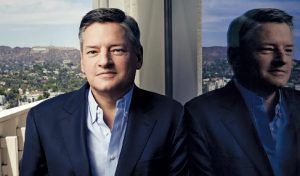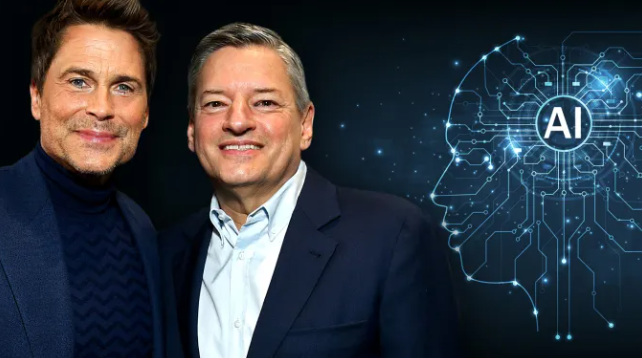News
Navigating the Future: Ted Sarandos Explores the Role of AI in Filmmaking and the Enduring Legacy of Human Creativity
In a world where technology continues to evolve at an unprecedented pace, the debate surrounding the integration of artificial intelligence (AI) into the realm of filmmaking has reached a fever pitch. At the forefront of this discussion stands Ted Sarandos, the influential chief of Netflix, whose insights offer a nuanced perspective on the intersection of AI and human creativity.

In an exclusive conversation with Rob Lowe on the SiriusXM podcast “Literally! with Rob Lowe,” Sarandos delved deep into the implications of AI in Hollywood. Rejecting the notion that AI could ever replace human filmmakers, Sarandos emphasized the intrinsic value of the human experience in storytelling. He articulated that while AI can serve as a tool for creators, it cannot replicate the authenticity and emotional depth that human storytellers bring to their craft.
The dialogue between Sarandos and Lowe echoes broader industry conversations that have arisen in the wake of last year’s contentious strikes, where AI emerged as a pivotal point of contention. The Writers Guild of America (WGA) and SAG-AFTRA found themselves locked in negotiations with studios over protections against AI usage, a battle that would culminate in prolonged strikes spanning over 100 days.
Sarandos’ stance on AI underscores a fundamental truth: while technology may offer innovative tools, it is the human touch that imbues storytelling with meaning and resonance. He pointed to the unprecedented success of Netflix’s “Squid Game” as evidence of the irreplaceable value of human creativity. The Korean series captivated global audiences not only for its gripping narrative but also for its authenticity and cultural specificity, elements that AI would struggle to replicate.
Despite the potential for AI to revolutionize content creation, Sarandos remains cautious about its widespread adoption. While he envisions a future where users may leverage AI to generate their own content on Netflix, he acknowledges the enduring allure of human-crafted stories. Sarandos expressed concern over a potential shift towards passive consumption of AI-generated narratives, highlighting the profound human connection inherent in traditional storytelling.
As negotiations between industry guilds and studios continue, AI remains a pivotal point of discussion. While specific demands have yet to be disclosed, the inclusion of provisions safeguarding against AI usage underscores its significance in shaping the future of filmmaking. With contracts set to expire in the coming months, the industry braces for further deliberations on AI’s role in preserving the authenticity and integrity of storytelling.
The conversation between Sarandos and Lowe offers a glimpse into the complex dynamics at play in Hollywood’s ongoing evolution. As technology continues to push boundaries, Sarandos’ steadfast advocacy for the human element serves as a poignant reminder that while AI may offer innovation, it is the human spirit that ultimately breathes life into art. In a landscape where technology reigns supreme, the enduring power of human creativity remains an irreplaceable force.

Ted Sarandos, the esteemed head honcho at Netflix, recently engaged in a thought-provoking discussion on the intersection of artificial intelligence (AI) and filmmaking, underscoring the enduring significance of human creativity in storytelling. In an exclusive conversation with Rob Lowe on Lowe’s SiriusXM podcast “Literally! with Rob Lowe,” Sarandos articulated a nuanced perspective, characterizing AI not as a substitute for human ingenuity, but rather as a supplementary tool for creators.
The discourse stemmed from the backdrop of recent industry upheavals, notably strikes where AI emerged as a contentious issue. Sarandos acknowledged the ongoing debate’s complexity, recognizing the imperative for creators to adeptly harness AI’s capabilities. He posited that mastery of these tools could confer a competitive advantage, though he cautioned against overestimating AI’s capacity to authentically replicate the human experience.
Drawing from the resounding success of Netflix’s “Squid Game,” Sarandos underscored the pivotal role of human insight and authenticity in captivating audiences worldwide. The Korean sensation’s unparalleled resonance, he argued, emanated from its distinctly human touch, a quality that remains elusive to AI algorithms.
While envisioning a future where AI empowers users to curate personalized content experiences, Sarandos expressed reservations regarding the erosion of traditional storytelling’s intrinsic value. He evoked concerns about a potential paradigm shift towards passive consumption of AI-generated narratives, questioning the profound emotional impact of such content.
Despite the burgeoning prominence of AI within Hollywood’s echelons, Sarandos and his counterparts have largely maintained a measured stance on the matter. Last year’s protracted negotiations between industry guilds and studios underscored AI’s emergence as a pivotal bargaining chip, reflecting heightened apprehensions over its encroachment on creative domains.

As pivotal negotiations between IATSE, the Hollywood Basic Crafts, and the Alliance of Motion Picture and Television Producers (AMPTP) unfold, AI’s role in shaping industry dynamics looms large. While specific demands remain undisclosed, AI’s implications for the future of filmmaking are undeniably central to deliberations.
The forthcoming episode of “Literally! with Rob Lowe” promises to provide further illumination on this enthralling discourse surrounding AI’s evolving role in filmmaking. Sarandos’ insightful reflections serve as a poignant reminder of the enduring primacy of human creativity amidst the ever-expanding frontiers of technological innovation.
Access fakenotesales.com to see more latest articles!

